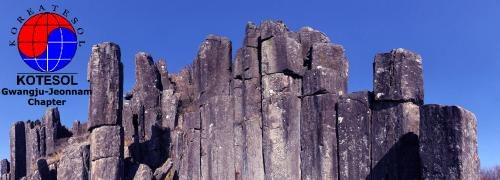
Gwangju-Jeonnam Chapter January Meeting
----- Morning Reflective Practice Session -----
Time: 11:00 a.m. - 12:30 p.m.
Topic: Project-Based Learning
Place: Starbucks, Chosun University Branch; near University "backgate."
----- Main Meeting Schedule -----
Time: Saturday, January 10, 2015, 1:45 - 5:00 p.m.
Place: Chosun University Main Building (Gwangju), 4th Floor, Room 4211
1:45 pm: Sign-in and Meet-and-Greet (Admission is free. Future membership is welcomed.)
2:00 - 2:50 pm: Presentation 1
How Suspending Judgment Can Help Us Reflect on Teaching (even though it can be hard to do!)
Bryan Hale (Sunkyung Academy, Gwangju)
2:50 - 3:10 pm: Refreshment Break
3:10 - 4:25 pm: Presentation 2
Developing Critical Global Citizens: A Lesson for the Teacher?
Jocelyn Wright (Mokpo National University)
4:30 pm: Swap-Shop: Share your Teaching Ideas, Classroom Activities, and Teaching Wisdom with the group. (Everyone is encouraged to briefly present an item, or two. Handouts welcomed.)
5:00 pm: Announcements / Drawing for Door Prizes / Closing
6:00 pm: After-meeting Dinner
--- January newsletter, The Gwangju Communicator, available as PDF at bottom of page. ---
_____________________________________________
Presentation Synopses and Presenter Bio Sketches
.
How Suspending Judgment Can Help Us Reflect on Teaching (even though it can be hard to do!)
By Bryan Hale
The Presentation
If you hang around teachers in Korea who go to reflective practice meetings, you’ll quickly hear about a “reflective cycle” with different stages. The early stages ask us to think about our teaching experiences without judgment or criticism – to separate observations about what has happened in class from interpretations of the quality of what has happened, and first to just observe. But this can be hard to do!
It can be difficult for several reasons. We may have reacted emotionally to events, and find it hard to distance ourselves from the reactions we have already had. Maybe our minds, trying to be helpful, have already formed judgments and interpretations that are pretty difficult to shake even if we want to move past them. Interactions with co-workers, students, or administrators may make us feel stuck in a web of unreflective thoughts. We might find that it’s difficult to get our inner critical demon voice to shut up for just a minute – or that it has learned to do great impersonations of those unhelpful voices we’re hearing at work.
In this session, we will explore the benefits of suspending judgment, as well as think about why it can be hard to do. We will discuss the challenges around getting reflections started. And we will look at some techniques for getting emotional distance from events, accessing our experiences and knowledge in different ways, and getting that inner critical demon to wait outside for a while.
The Presenter
Bryan Hale is from Australia. After graduating with a Bachelor of Arts in English, he spent a chunk of life in an office job in Sydney, wondering what you do with a BA in English. Then he got a CELTA and found out that he loves English language teaching. Bryan has been in Korea since 2011. He currently teaches elementary and middle school students at Sunkyung Academy in Gwangju. His previous experience includes teaching in a public middle school, and teaching students from very young to adult. Email: bryan.english.teacher@gmail.com
_____________
Developing Critical Global Citizens: A Lesson for the Teacher?
By Jocelyn Wright
The Presentation
Educating for national citizenship was already a challenge. Today, even more is demanded of teachers: that they develop global citizens. According to OXFAM (2006), this means helping students to acquire knowledge, understanding, skills, values, and attitudes that will enable them to question and critically explore a wide range of complex issues with local and global implications that they may then tackle as active citizens. OXFAM emphasizes the importance of five broad areas: diversity, globalization and independence, peace and conflict, social justice and equity, and sustainable development. The latter will be the focus of this two-activity lesson, aimed at helping teachers who want to develop critical global citizens to reflect critically on their own teaching.
In the area of critical pedagogy, Paulo Freire’s work is often cited. In his Pedagogy of the Oppressed, inspired by his experience teaching literacy to adults in rural Brazil through the 1960s, he presents two different approaches to teaching, the traditional one, which he calls the "banking concept," and "dialogics." The latter method of problem-posing requires a new teacher-student relationship and is considered an instrument of liberation in a truly humanizing endeavor.
The activities presented here will try to illustrate the spirit of the two contrasting approach mentioned above. A debriefing session, where participants will be invited to discuss the perceived potential, limitations, and implications of each with regard to their roles, the proposed prompts, and their usefulness in developing critical global citizens, will follow. Time-permitting, a discussion of OXFAM’s curriculum for sustainable development will ensue.
References
Freire, P. (1993). Pedagogy of the oppressed. London, UK: Penguin Books.
OXFAM GB. (2006). Education for global Citizenship: A guide for schools. Retrieved from http://www.oxfam.org.uk/~/media/Files/Education/Global%20Citizenship/edu...
The Presenter
Jocelyn Wright works in the Department of English Language and Literature at Mokpo National University. She has an honor’s degree in Linguistics, a master’s degree in Education in Counseling and Training, and is also CELTA certified. She has been teaching English in Korea at the university level for over six years, is actively involved in KOTESOL at the chapter level, and coordinates the local Reflective Practice Special Interest Group (RP-SIG). Her interests currently include professional development and content-based learning.
| Attachment | Size |
|---|---|
| 378.99 KB |


